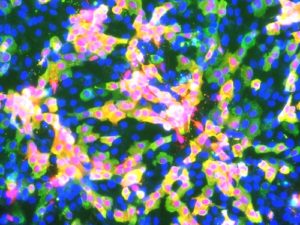COVID-19 Briefs
TEXAS BIOMED AND PARTNERS DISCOVER NEW, POTENT COVID-19 ANTIBODY COCKTAIL
Texas Biomed researchers, led by Professor Luis Martinez-Sobrido, PhD, and collaborators at the University of Alabama at Birmingham, discovered a COVID-19 antibody cocktail that appears effective against all variants and other coronaviruses.
The cocktail includes two antibodies that target different parts of the virus’s spike protein and block different steps required for viral infection. The cocktail has been exclusively licensed to Aridis Pharmaceuticals, which is seeking to advance the inhaled, low-cost treatment to human clinical trials.

The antibodies target two places on the spike protein, including an area lower down described as the Achilles’ heel of the virus. If the virus mutates that spot to escape the antibody, it risks severe loss of function.

REPORTER VIRUSES IN ACTION
SARS-CoV-2 viruses designed to express fluorescent or bioluminescent proteins make it much easier to observe the virus in cells and live animals in the lab. Developed by Professor Luis Martinez-Sobrido, PhD, and his lab members, these “reporter viruses” enable faster screening of potential antiviral drugs, neutralizing antibodies and vaccines. Here, cells (blue) infected with the reporter virus glow red/pink. The reporter viruses were described in the Proceedings of the National Academy of Sciences (PNAS) and Journal of Virology.
INITIAL COVID-19 INFECTION ON THE SINGLE-CELL LEVEL, REVEALED
Texas Biomed and SNPRC researchers led by Professor Deepak Kaushal, PhD, in collaboration with Washington University in St. Louis, conducted the most detailed analysis to-date of SARS-CoV-2 in the lungs during the first three days of infection. The team used the latest single-cell sequencing technologies and animal models developed at Texas Biomed to gain insights not possible with human patients who don’t know when they became infected. By sequencing more than 170,000 single cells, they found immune cells called macrophages flood the lungs in response to an “intruder alert!” signal from proteins called type I interferons. The research, reported in Nature Communications, clarified these proteins help fight off infection, which is important for developing new COVID-19 treatments aiming to limit inflammation without blocking protective mechanisms.
HEALTH CARE HEROES

In October 2021, the San Antonio Business Journal honored Texas Biomed’s COVID-19 Research Team as 2021 Health Care Heroes. The Outstanding Medical Research Team Award recognized Texas Biomed’s unrelenting efforts to develop animal models, conduct preclinical testing of vaccines and treatments, and study SARS-CoV-2 and its variants. As one of the team members accepting the award, SNPRC Director Deepak Kaushal, PhD, stressed everyone at the Institute, along with community and board support, made these achievements possible.
Science Snapshot: Maximum Containment Contract Research Team

Led by Professor Ricardo Carrion, Jr., PhD, (first row, far right), the MCCR team includes researchers, veterinarians, technicians, caretakers, pathologists, quality control specialists and lab staff. The largest lab at Texas Biomed, this team works on a variety of infectious diseases in biocontainment safety level 3 and 4 laboratories. Along with many colleagues across campus, they helped test COVID-19 vaccines for Pfizer-BioNTech and Novavax, as well as Regeneron’s monoclonal antibody cocktail. They continue to test vaccines and treatments against variants for pharmaceutical companies around the globe, as well as study other deadly pathogens.